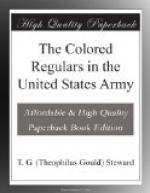Of these shattered heroes General Miles had but recently spoken in words well worthy his lofty position and noble manhood as “a regiment of colored troops, who, having shared equally in the heroism, as well as the sacrifices, is now voluntarily engaged in nursing yellow fever patients and burying the dead.” These men came up to Montauk from great tribulations which should have washed their robes to a resplendent whiteness in the eyes of the whole people. Great Twenty-fourth, we thank thee for the glory thou hast given to American soldiery, and to the character of the American Negro!
Thus these four colored regiments took their place on the march, in camp, in assault and in siege with the flower of the American Army, the choice and pick of the American nation, and came off acknowledged as having shared equally in heroism and sacrifices with the other regular regiments so engaged, and deserving of special mention for the exhibition of regard for the welfare of their fellow man. The query is now pertinent as to the return which has been made to these brave men. The question of Ahasuerus when told of the valuable services of the Jew, Mordecai, is the question which the better nature of the whole American people should ask on hearing the general report of the valuable services of the Negro Regular in the Spanish War. When Ahasuerus asked: “What honor and dignity hath been done to Mordecai for this?” his servants that ministered unto him were compelled to answer: “There is nothing done for him.” Looking over these four regiments at the time of this writing an answer somewhat similar in force must be returned. That the colored soldier is entitled to honor and dignity must be admitted by all who admire brave deeds, or regard the welfare of the state. The colored soldier, however, was compelled to stand by and see a hundred lieutenancies filled in the Regular Army, many in his own regiments, only to find himself overlooked and to be forced to feel that his services however valuable, could not outweigh the demerit of his complexion.
The sum total of permanent advantage secured to the colored regular as such, in that bloody ordeal where brave men gave up their lives for their country’s honor, consists of a few certificates of merit entitling the holders to two dollars per month additional pay as long as they remain in the service. Nor is this all, or even the worst of the matter. Men who served in the war as First Sergeants, and who distinguished themselves in that capacity, have been allowed to go back to their old companies to serve in inferior positions. Notably is this the case with Sergeant William H. Givens, whose history has been detailed as commanding Troop D, Tenth Cavalry, after Captain Bigelow fell, and who heroically led the troop up the hill. He is now serving in his old troop as Corporal, his distinction having actually worked his reduction rather than substantial promotion.




